
The Girl Nothing Happens To
(Adventures of 21st-century Alice — Told by Her Father)
by Kirill Bulychev
INSTEAD OF A FOREWORD
Tomorrow Alice starts school. It should be a very interesting day. From early morning her friends and acquaintances have been calling her on the videophone to wish her a good beginning. But for three months now, Alice herself has talked only of going to school — giving nobody any peace.
The Martian Buce sent her a really remarkable pencil-box which nobody has been able to open, so far. Not I, nor my colleagues either, though two of them are Doctors of Science and one the chief engineer of the zoo.
Shusha said he would go to school with Alice and ascertain whether her teacher is sufficiently experienced and worthy of my daughter.
A surprising amount of fuss. When I went to school for the first time, I can’t remember anybody making such a hubbub over it.
The turmoil has quieted down a bit now. Alice has gone to the zoo to say good-bye to Bronty.
And while the house is quiet, I’ve decided to tape-record a number of stories about Alice and her friends. I shall pass on the tapes to Alice’s teacher. It will be useful for her to know what a flighty creature she has to deal with. Maybe the tapes will help the teacher educate my daughter.
At first Alice was just like any other child. Until she was three. The first story I’m going to tell will prove my contention. But a year later, when she met Bronty, the knack of doing everything she was not supposed to do suddenly appeared in her character: she got lost at a most inappropriate time and made chance discoveries beyond the powers of the most eminent scientists of our modern age. Alice has a positive talent for taking advantage of those she is on friendly terms with but, none the less, she has droves of real friends. It makes it difficult, sometimes, for us — her parents. You see, we cannot stay home all the time. I work at the zoo and her mother builds houses, sometimes on other planets.
I want to warn Alice’s teacher beforehand — it won’t be easy for her, either. To prove my point, I shall relate some perfectly true stories about what happened to Alice in different places on Earth and in space, over the last three years.

I VIDEOPHONE A NUMBER AT RANDOM
Alice is not asleep. Ten o’clock, and she is not asleep. So then I said: ” Alice , go to sleep at once, or else…”
“What’s ‘or else’, Daddy?”
“Or else I’ll call Baba-Yaga[1] on the videophone.”
“And who’s Baba-Yaga?”
“Why, all children ought to know that! Baba-Yaga, pegleg hag-o, is a terribly wicked old woman who eats up little children. Disobedient ones.”
“Why?”
“Well, because she’s wicked and hungry.”
“And why is she hungry?”
“Because her hut is not equipped with a food supply pipe.”
“Why not?”
“Because her hut is an old rack-and-ruin, far away in the forest.”
Alice became so interested, she even sat up in bed.
“Does she work in a forest reserve?”
“ Alice , go to sleep at once.”
“But, Daddy, you promised to call Baba-Yaga. Please, Daddy dear, call Baba-Yaga.”
“I’ll call her. But you’ll be very sorry I did.”
I went to the videophone and pressed a few buttons at random. I was sure no connection would be made, and Baba-Yaga would be ‘not at home’.
But I was mistaken. The videophone screen lit up, shone brightly, and a click sounded — somebody had pushed the receiving button at the end of the line and, before his image appeared on the screen, a sleepy voice spoke: “This is the Martian Embassy.”
“D’you suppose she’ll come, Daddy?” cried Alice from the bedroom.
“She’s already gone to sleep,” I snapped angrily-
“This is the Martian Embassy,” the voice repeated.
I turned back to the videophone. A young Martian was looking at me. He had green eyes with no eyelashes.
“Excuse me,” I said. “Apparently, I pushed the wrong number.”
The Martian smiled. He was not looking at me, but at something behind my back. Why, of course. Alice had got out of bed and stood behind me, bare-foot.
“Good evening,” she said to the Martian.
“Good evening, little girl.”
“Does Baba-Yaga live in your house?”
“You see,” I said. ” Alice wouldn’t go to sleep, and I wanted to videophone Baba-Yaga to punish her. But I got the wrong number.”
The Martian smiled again.
“Good night, Alice ,” he said. “You’d better go to sleep, or else your Dad will call Baba-Yaga.”
The Martian said good-bye and switched off.
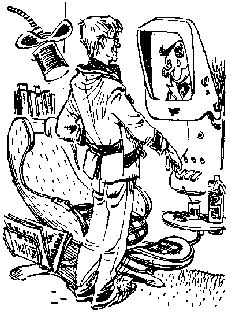
“Well. Now will you go to sleep?” I asked. “You heard what the man from Mars told you?”
“I’m going. And will you take me to Mars?”
“If you behave yourself, we’ll fly there next summer.”
Finally Alice fell asleep, and I sat down again to work. I worked till one in the morning. And at one o’clock, the videophone suddenly gave a muffled whirr. I pushed the button. It was the Martian from the embassy.
“I beg your pardon for disturbing you so late,” he said. “But your videophone wasn’t turned off, and I decided you weren’t asleep yet.”
“That’s quite all right.”
“Would you mind helping us out?” said the Martian. “The whole embassy cannot sleep. We’ve gone through all the encyclopaedias, searched the videophone directory, but we can’t find out who Baba-Yaga is or where she lives…”
BRONTY
A brontosaurus egg was brought to us at the Moscow zoo. The egg was found by Chilean tourists in a landslide on the shores of the Enisei river. It was almost round in shape and wonderfully preserved in the permafrost. When specialists began examining it, they discovered the egg was absolutely fresh. And so they decided to put it in the zoo’s incubator.
Naturally, there were not many who believed it would hatch successfully, but after a week’s time X-ray plates showed that the brontosaurus embryo was developing. As soon as the news went out over intervision, scientists and reporters began flying in to Moscow from all directions. We had to engage all the rooms in the eighty-storey Venus hotel on Gorky Street . And even then, there was not enough room for everybody. Eight Turkish palaeontologists slept in my dining-room, I moved into the kitchen with a journalist from Ecuador , while two women reporters from the magazine Women of the Antarctic were settled in Alice’s bedroom.
When my wife videophoned that night from Nukus where she was building a stadium, she thought she had the wrong number.
All the Earth teletransmission satellites beamed photographs of the egg. Side view, front view, the brontosaurus skeleton, and the egg…
A congress of cosmophilologists arrived in full strength to visit the zoo. But by that time, we had already stopped all entry into the incubator room, and they had to be satisfied with viewing the polar bears and the Martian praying mantis.
On the forty-sixth day of this lunatic way of life, the egg quivered. At that moment my friend, Professor Yakata, and I were sitting beside the armoured glass shelter, where we kept the egg, drinking tea. By then we had stopped believing that anything would hatch from the egg. We didn’t X-ray it any more, d’you see, for fear of harming our “baby”. And we could not make any predictions, because nobody but ourselves had ever tried hatching out a brontosaurus.
And so, the egg quivered, gave another crack and split — through its thick, leathery shell, a black snake-like head began pushing its way out. A whirring sound came from the automatic cinecameras. I realized the red lamp over the incubator doors had flashed on. Something very much like a panic broke out all through the grounds of the zoo.
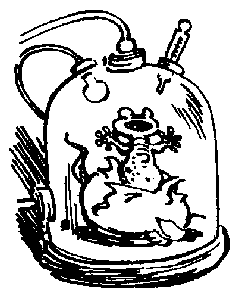
In five minutes, we were surrounded by everybody whose job it was to be here and many who had no business to be but wanted to see. And in such a crowd, it grew very hot.
Finally the little brontosaurus crawled out of the egg.
“What’s his name, Daddy?” I suddenly heard a familiar voice.
“ Alice !” I cried in surprise. “How did you get in here?”
“I’m with the reporters.”
“But children aren’t allowed in here.” “But I am! I told everybody I was your daughter. And they let me in.”
“You realize it’s not nice to use people you know for personal aims?”
“But Daddy, little Bronty might be bored without children. That’s why I came.”
I threw up my hands in despair. I didn’t have a minute to spare to take Alice out of the incubator. And there was nobody around who would agree to do it for me.
“You stand right here, and don’t go away,” I told her. Then I ran to the glass shelter that held the new-born brontosaurus.
That whole evening Alice and I weren’t on speaking terms. We had quarrelled. I forbade her to go into the incubator, but she said that she couldn’t obey me because she was sorry for Bronty. And the next day she stole into the incubator again. She came with the astronauts from the spaceship Jupiter-8. They were heroes, and nobody could refuse them anything.
“Good morning, Bronty,” she said, going over to the shelter.
The brontosaurus looked sidewise at her.
“Whose child is this?” asked Prof. Yakata, strictly.
I almost wished the earth would swallow me up.
But Alice was never at a loss for words.
“Don’t you like me?” she asked.
“What a question, on the contrary… I simply thought you were lost, perhaps…” The professor had no gift at all in talking with little girls.
“All right,” said Alice . “Bronty, I’ll come and see you tomorrow. Don’t you feel lonely now.”
And Alice really did come the next day. And kept coming almost every day. Everyone got used to her and let her in without question. I washed my hands of it. After all, our house stood next to the zoo, there was no road to cross, and besides she always found someone to bring her in.
The brontosaurus grew very fast. In a month’s time he was over two and a half yards long, and we moved him into a pavilion specially built for him. The brontosaurus wandered along the railed-in enclosure and chewed young shoots of bamboo and bananas. The bamboo was brought in by freight jet planes from India , and the bananas came from the “Irrigation-Field” state farm. A warm salt-water pool shone in the centre of the enclosure. Everything to please a brontosaurus.
But suddenly he lost his appetite. For three days, the bamboo and bananas lay untouched. On the fourth day, the brontosaurus lay on the bottom of the pool, his small black head resting on the plastic rim. Everything indicated he intended to die. We could not permit it. You see, he was the only brontosaurus we had. The best doctors in the world tried to help us, but all in vain. Bronty refused grass, vitamins, oranges, milk — everything.
Alice did not know of the tragedy. I had sent her to her grandmother’s in Vnukovo. But on the fourth day, she turned on the television at the very moment they were giving the news about the failing health of the brontosaurus. I still don’t know how she persuaded her grandmother, but that same morning Alice ran into the pavilion.
“Daddy!” she cried. “How could you keep it from me? How could you?…”
“Later, Alice , later,” I answered. “We are having a meeting.”
And so we were having a meeting. It had been going on for the last three days.
Alice said nothing, and went away. But the next moment I heard somebody beside me gasp. I turned and saw that Alice had already climbed over the guard-rail, slipped into the enclosure and started running toward the brontosaurus’s head. She had a bun in her hand.
“Eat it, Bronty,” she said, “or else they’ll leave you here to die of hunger. In your place, I’d be fed up with bananas, too.”
And before I managed to reach the guardrail, something unbelievable happened. Something which made Alice famous, but had an awful effect on our reputation, as biologists.
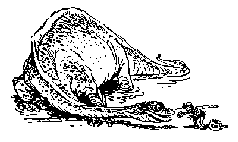
The brontosaurus raised his head, looked at Alice , and carefully took the bun from her hand.
“Quiet, Daddy.” Alice threatened me with her finger, on seeing that I wanted to leap over the railing. “Bronty’s afraid of you.”
“He’s not going to harm her,” said Prof. Yakata.
I could see that for myself. But what if her grandmother was watching the scene?
Afterwards, scientists argued over it for a long time. They are still arguing to this day.
Some say that Bronty needed a change of food, others that he trusted Alice more than he did us. But, one way or another, the crisis was over.
Now Bronty has become completely tame.
Though he is about thirty yards long, nothing gives him greater delight than to let Alice ride on his back. One of my assistants made a special step ladder and, when Alice enters the pavilion, Bronty reaches his long neck into the corner and picks up the step ladder standing there with his triangular teeth, setting it deftly against his shining black side.
Then he gives Alice a ride round the pavilion or swims in the pool with her on his back.
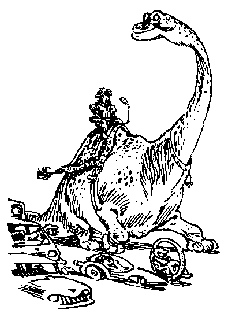
TUTEKSI
As I’d promised Alice , I took her to Mars with me when I flew there to attend a conference.
We landed safe and sound. True, I don’t tolerate weightlessness too well, so I kept my seat during the trip, but my daughter flitted about the spaceship all the time. Once we had to pull her off the ceiling in the control deck because she wanted to push the red button, namely, the button for emergency braking. But the pilots weren’t very angry with her.
On Mars, we went sightseeing in town, travelled with tourists into the desert and visited the Great Caves . But after that I had no time for Alice and installed her in a boarding-school for a week. Many of our specialists work on Mars, and the Martians helped us build a huge cupola over a miniature Kinder-town. There are real earth trees growing there — it is a fine place. Sometimes the children go on excursions. Then they wear small space-suits and come out into the big city streets walking in double rows.
The school-mistress, Tatyana Petrovna was her name, said I wasn’t to worry. Alice told me the same, too. And we parted for a week.
The third day, Alice disappeared.
It was a perfectly extraordinary occurrence. To begin with, in all the history of the boarding-school, not one inmate had ever disappeared, or even been lost, for more than ten minutes. On Mars, it is simply impossible to get lost in town. And all the more so for an Earth-child, dressed in a space-suit. The very first Martian who met the child would bring him or her back. And the robots? And the Security Service? Why, it’s impossible to get lost on Mars.
But Alice got lost.
She hadn’t been seen for about two hours, when they called me away from the conference and took me to the boarding-school on a Martian Cross-Country Hopper. When I appeared under the cupola, I probably looked rather upset, because everybody gathered there fell silent in sympathy. And who wasn’t there, though! All the teachers and workers at the boarding-school, ten Martians in space-suits (they had to wear them under the cupola because of the heavier Earth air pressure), interstellar pilots, Chief Nazaryan of the Life-Saving Service, archaeologists…
Apparently, for over an hour the city television centre had been broadcasting the news, every three minutes, that a little girl from Earth had disappeared. All videophones on Mars gave out alarm signals. Lessons were stopped in Martian schools while the pupils, in groups, combed all the city and its environs.
Alice’s disappearance had been discovered only when her group had returned from a walk. Two hours had passed since then. And the air in her space-suit tank was sufficient to last only three hours.
Knowing my daughter, I asked if they had looked for her in all secluded nooks in the school or near it. Perhaps she had found a Martian praying mantis, and was absorbed in watching it…
I was told there were no cellars in town, and all secluded spots had been searched by the pupils and by the Martian university students who knew such places like the palms of their hands.
I was angry at Alice . Why, of course, any second she would come round the corner wearing the most innocent expression in the world. And, really, her behaviour had caused more trouble in the city than a sand storm. All the Martians and all the Earthmen living in town had had to drop all their affairs, all the life-saving personnel had been called in to help. At the same time I was beginning to be seriously alarmed. This adventure of hers might end badly.
News from the search parties kept pouring in: “Pupils of the Second Martian Grammar School inspected the stadium. No Alice “, “The Martian Sweets Factory reports that no child has been found on its territory…”
“Maybe she has actually managed to get into the desert?” I thought. “She would be found by now if she were in the city. But the desert… The Martian deserts have not yet been fully explored, and you could get lost there and not be found for ten years or more. But the nearest desert vicinities have already been searched on cross-country hoppers…”
“They’ve found her!” suddenly cried a Martian in a blue tunic, as he stared into a pocket television set.
“Where? How? Where?” came excited cries from everybody under the domed cupola in Kinder-town.
“In the desert, one hundred and fifty miles away.”
“One hundred and fifty!”
“Of course,” I thought to myself. “They don’t know my Alice . Just what one might expect of her.”
“The girl’s feeling fine, and will soon he here.”
“But how did she get out there?”
“On a post jet plane.”
“But of course,” said Tatyana Petrovna, beginning to cry. She had suffered more than any of us.
Everybody hurried to comfort her.
“We were walking past the post-office, and they were loading the robot post-jets. But I didn’t pay any attention, because you see them a hundred times a day.”
And ten minutes later, when the Martian pilot brought Alice in, everything was cleared up.
“I crawled in to get a letter,” said Alice .
“What letter?”
“But Daddy, you said Mum would write us a letter. So I looked in the jet to see if I could find it.”
“You crawled inside?”
“But of course. The doors were open, and many letters were there.”
“And then?”
“I no sooner crawled in, when the doors closed and the jet took off. I started looking for the button, to stop it. There were many buttons. When I pushed the last one, the jet landed and the door opened. I went out and all around there was only sand, and no Tatyana Petrovna, and no children.”
“She pushed the button for an emergency landing!” said the Martian in the blue tunic, all admiration.
“I cried a bit, and then decided to come home.”
“And how did you guess which way to go?”
“I climbed up a small hill to take a look from there. And there was a door in the hill. I could see nothing from the hilltop. So then I went into the room and sat down.”
“What door?” wondered the Martian. “There’s only desert in that area.”
“No, there was a door and a room. And in the room there was a big stone. Like an Egyptian pyramid. Only a small one. Remember, Daddy, you read me a book about an Egyptian pyramid?”
Alice’s unexpected explanation greatly excited the Martian and Chief Nazaryan of the Life-Saving Service.
“The Tuteksi!” they cried.
“Where was the girl found? Give us the position!”
And half those present disappeared like smoke. Then Tatyana Petrovna, who had personally brought Alice something to eat, told me that thousands of years ago on Mars there had once lived a mysterious civilization called the Tuteksi. Only small stone pyramids remained as relics. Up to now, neither the Martians nor Earth archaeologists had been able to find a single building of the Tuteksi — there were only small pyramids scattered through the desert and covered with sand. And now Alice had actually stumbled on a Tuteksi building.
“There, you see. Again you’re in luck,” I said. “But all the same, I’m taking you home at once. You can get lost there all you want. Without a space-suit.”
“I also prefer getting lost at home,” said Alice.
… Two months later I read an article in the Russian journal Round the World. It was called “What the Tuteksi Were Like”, and stated that a valuable monument of the Tuteksi culture had at last been found in the Martian desert. Now scientists were engaged in deciphering the writings on the pyramid. But the most interesting of all was the discovery of a drawing of a Tuteks, in a wonderful state of preservation. And there was a photograph of the pyramid with the portrait of a Tuteks.
Somehow, this portrait seemed familiar, and a strange foreboding came over me.
“Alice,” I said in my severest voice. “Tell me the truth, now. Did you draw anything on the pyramid when you were lost in the desert?”
Before answering, Alice came up and looked attentively at the picture in the journal.
“That’s right, it’s a drawing of you. Only I didn’t draw it, I scratched it with a stone. I was so awfully bored…”
THE SHY LITTLE SHUSHA
Alice has many animal friends. Two kittens; a Martian praying mantis which lives under her bed and imitates a balalaika at night; a hedgehog, who lived with us briefly and then went back to the woods; the brontosaurus Bronty — Alice visits him in the zoo — and lastly our neighbours’ dog, Rex, a toy dachshund, but to my mind, of dubious breed.
Alice acquired one more animal when the first expedition to Sirius returned.
She met Poroshkov at the First of May demonstration. How she arranged it, I don’t know — Alice has wide connections. One way or another, she mingled with the children who presented flowers to the astronauts. Imagine my surprise when I saw Alice on television! She was running across the square carrying a bouquet of blue roses bigger than herself, and she gave it to Poroshkov.
Poroshkov took her up in his arms. They watched the parade together, and left together.
Alice returned home only toward evening, carrying a large red case.
“Where have you been?”
“Most of the time, at kindergarten,” she answered me.
“And the rest of the time?”
“We also went to the Red Square.”
“And after that?”
Alice realized I had seen her on television.
“Besides, I was asked to welcome the astronauts.”
“Who asked you to do that?”
“A friend of mine — you don’t know him.”
“Alice, have you ever come across the term ‘corporal punishment’?”
“Oh, I know: that’s when you get a spanking. But I thought it only belonged in fairy tales.”
“I’m afraid we’ll have to make the fairy tale a fact. Why do you always worm yourself into places you shouldn’t?”
Alice was on the point of showing her resentment, but suddenly the red case in her arms began jiggling.
“What have you got there?”
“It’s a present from Poroshkov.”
“You asked him for a present. That’s going too far!”
“I didn’t ask for anything. It’s a shusha. Poroshkov brought them from Sirius. A little shusha, a baby shusha, you might say.”
And Alice carefully pulled out of the red case a six-legged creature resembling a kangaroo. The baby shusha had the large bulging eyes of a dragon-fly. It rolled its eyes quickly, clinging tightly to Alice’s dress with its forepaws.
“See? He loves me already,” said Alice. “I’ll make him a bed.”
I knew the story of the shushas. Everybody did, especially we biologists. I have five of them now in the zoo, and from day to day we expect additions to the family.
Poroshkov and Bauer had found the shushas on one of the planets in the system of Sirius. They were gentle, inoffensive creatures who stuck close to the astronauts. They were mammals but, above all, they reminded you of penguins by their habits. The same patient curiosity, the same everlasting attempts to crawl into the most inappropriate places. Once Bauer had to rescue a baby shusha who was about to drown himself in a huge tin of condensed milk. The expedition brought back a whole film on the shushas; it was a big hit at all the cinemas and on TV.
Unfortunately, the expedition had no time for a proper study of these animals. They only knew that the shushas came into camp in the mornings, and disappeared at nightfall, hiding somewhere in the cliffs.
One way or another, when the expedition was already on the way back, Poroshkov found three shushas in one of the ship’s compartments. They had probably got lost in the spaceship. True, Poroshkov thought at first that the shushas had been smuggled on board by one of the crew, but the latter’s indignation was so sincere he had to abandon his suspicions.
The appearance of the shushas gave rise to a mass of additional problems. First, they might prove to be the source of unknown infections. Second, they might die during the trip, from the change of conditions. And lastly, nobody knew what they ate… And so on… But all misgivings proved false. The shushas held out perfectly during the disinfection period, obediently fed on bouillon and tinned fruits. Over the last, they made a deadly enemy of Bauer who was extremely fond of fruit preserves, for the crew had to get along without any during the last months of the trip so the stowaways could be fed.
One fine day during the long journey, a shusha gave birth to six little ones. So when the ship landed on Earth, it was overladen with shushas and their babies. The animals were quick to learn, and caused nobody any unpleasantness or discomfort — except Bauer, of course.
I remember the historic moment when the expedition landed. The hatchway opened and under the eyes of the cinema and TV cameras out came these amazing, six-legged creatures followed by their little ones, instead of the spacemen. A sigh of wonder ran through the Earth. But at that moment a smiling Poroshkov followed the shushas down the ship’s ramp, carrying in his arms a baby shusha all splotched with condensed milk.
Some of the animals arrived in our zoo, others remained pets of the astronauts. Poroshkov’s baby shusha finally ended up with Alice. God knows how she charmed it away from such a stern chap as Poroshkov.
The shusha lived in a large basket beside Alice’s bed, did not eat meat, slept soundly at night, made friends with the kittens, was afraid of the praying mantis, and softly purred when Alice stroked him or told him all her ups and downs.
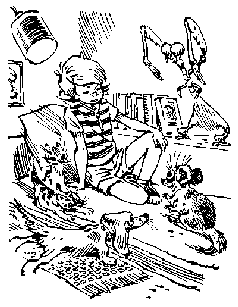
Shusha — so we named him — grew quickly and in two months was as tall as Alice. They would go walking in the park opposite our house, and Alice never used a collar or leash with the animal.
“What if he frightens somebody?” I asked.
“Oh, he wouldn’t. And besides, his feelings would be hurt if I put a collar on him. You see, he’s so sensitive.”
Once Alice could not sleep. She was capricious and insisted I read her the story of Dr. Doolittle.”
“I’ve no time, child,” I told her. “I’ve some rush work to do. By the way, it’s time you read books yourself.”
“But it’s not a book — it’s a microfilm, and the letters are tiny.”
“Well, there’s a sound attachment. If you don’t want to read it, switch on the sound.”
“I don’t want to get out of bed to switch it on. I’m cold.”
“Then you’ll have to wait. I’ll finish what I’m writing and come and turn it on.”
“You don’t want to. I’ll ask Shusha.”
“Then ask him,” and I smiled to myself.
A minute later I suddenly heard the gentle microfilm voice in the next room: “…And Dr. Doolittle also had a dog called Avva.”
That meant Alice had got up to switch it on.
“Get right back into bed,” I called out. “You’ll catch cold.”
“But I am in bed.”
“You shouldn’t tell lies. Who turned the microfilm on, then?”
“Shusha.”
I certainly did not want my daughter to grow up a liar. I put my work aside, and went to her room for a serious talk.
The screen hung on the wall. Shusha was running the micro-projector, and on the screen some unfortunate animals were crowding round the door of the good Dr. Doolittle.
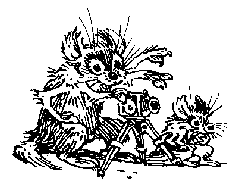
“How did you manage to train him?” I asked, sincerely surprised.
“I didn’t have to train him. He can do everything himself, without that.”
Shusha shyly moved his front paws up and down over his chest. There was an awkward silence.
“But just the same…” I finally got out.
“Excuse me,” broke in a shrill, wheezy voice. It was Shusha. “But I really did learn to do it myself. After all, it’s not difficult.”
“Would you mind telling me how…” I began.
“It’s not difficult,” repeated Shusha. “The day before yesterday you showed Alice a fairy tale about the King of the Praying Mantises.”
“No, that’s not what I meant. How did you learn to talk?”
“We practised together,” said Alice.
“I simply can’t take it in. Dozens of biologists are working with the shushas, but not one of them has said a single word.”
“And our Shusha can even read. Can’t you?”
“A bit.”
“He tells me such interesting things…”
“Your daughter and I are great friends.” “But why have you kept silent so long?”
“He’s shy,” Alice answered for the shusha. Shusha lowered his eyes.
THE SPECTRE
In summer, we live at Vnukovo. It’s very convenient, because the monorail goes there, arid from the stop to the cottage it’s only a five-minute walk. In the woods across the road, many brown and orange-cap mushrooms grow — but not enough to go round for all who go gathering mushrooms.
I always went to the cottage straight from the zoo but, instead of finding relaxation, was caught up in the whirlpool of resort life. The vortex of it all was our neighbour’s boy, Kolya, famous through all Vnukovo for taking toys away from children. A psychologist had even come from Leningrad to see him, and afterwards wrote his thesis on the boy. The psychologist made a study of Kolya, but the latter kept eating jam and whining day and night. I brought him a three-wheeled photon-rocket from town, hoping he wouldn’t whimper so much.
Living there besides Kolya were his old grandmother — who loved to talk on genetics and was writing a novel about Mendel — Alice’s grandmother, a boy called Yuri and his mother Karma; then there were the three triplets on the next street who sang in a chorus under my window, and last of all — the Spectre.
The Spectre lived somewhere under an apple-tree in the garden, and had turned up comparatively recently. Only Alice and Kolya’s grandmother believed in it, but nobody else.
Alice and I were sitting on the verandah waiting for our new robot — put out by the Shchelkovo factory — to make farina for supper. The robot had already short-circuited twice, and both Alice and I had cursed the factory, but neither of us wanted to do the cooking ourselves and Granny had gone to the theatre.
Then Alice said: “He’ll come today.”
“Who will?”
“My specater.”
“Spectre,” I corrected her, automatically, not taking my eyes off the robot.
“All right,” said Alice, not bothering to argue. “So it’s my ‘spectre’ then. And Kolya stole nuts from the triplets. Isn’t that amazing?”
“Quite amazing. What were you saying about the spectre?”
“He’s very nice.”
“You think everybody’s nice.”
“Except Kolya.”
“Well, except Kolya. Honestly, if I brought home our new, fire-spitting serpent, I’m sure you’d make friends with it.”
“Probably. Is it kind?”
“Nobody’s been able to talk with it on that subject yet. Its home is on Mars, and it spits boiling hot poison.”
“Probably its feelings are hurt. Why did you bring it away from Mars?”
I could find nothing to answer. It was the utter truth. We hadn’t asked the snake’s permission before shipping it on the Kaluga from Mars. And on the way, it had swallowed the spaceship crew’s favourite dog. After that, all the astronauts hated it.
“So what’s all this about a spectre? What does it look like?” I changed the subject. “It walks only when it gets dark.” “Well, naturally. Spectres have done that since the beginning of time. Have you been listening to the tales of Kolya’s grandma?”
“His grandma only tells me about the history of genetics. About the persecution of Mendel.” “Ye-s, and incidentally how does your spectre react to the crow of a cock?” “He doesn’t. Why should he?” “Well, you see, respectable spectres are supposed to vanish, uttering terrible curses, when the cock crows.”
“I’ll ask him about it this evening.” “Very well.”
“And to-night I’ll go to bed a bit later. I have to talk with the spectre.”
“Please do. All right, we’ve had our little joke, and that’s enough. The robot’s overcooked the cereal again.”
Alice concentrated on her cereal, and I on some scientific reports from the Guiana zoo. There was an interesting article on Stingites. A revolution in zoology. They had managed to breed them in captivity. At birth, the offspring were dark-green, despite the fact that the shells of both parents were blue. It was growing dark.
“Well, I’m off,” said Alice.
“Where are you going?”
“To the spectre. You already promised I could.”
“But I thought you were joking. Well, if you must go into the garden, go inside and put on a sweater. It’s turning cold. And don’t go farther than the apple-tree.”
“Why should I? That’s where he’s waiting for me.”
Alice ran into the garden. I followed her with half an eye. I did not want to invade her world of fantasy. Let her surround herself with spectres and wizards, with brave knights, and good giants from fairy-like blue planets… Of course, just so long as she went to bed on time and ate her meals regularly.
I turned out the verandah light, so it would not interfere with my watching Alice. There she was, nearing the old apple-tree with its thick, spreading branches. Now she was standing under it.
And then… A blue shadow moved away from the trunk of the tree, and came to meet Alice. The shadow seemed to float through the air not touching the grass.
The next moment, grabbing whatever heavy object I could find, I was running down the steps, taking them three at a time. There was something about this I didn’t like. It was either some kind of stupid joke, or… I didn’t think beyond that ‘or’.
“Careful, Daddy!” Alice cried in a loud whisper, hearing my footsteps. “You’ll frighten it.”
I caught Alice by the arm. Before me, a blue silhouette dissolved in air.
“Daddy, what have you done! You see, I almost saved it.”
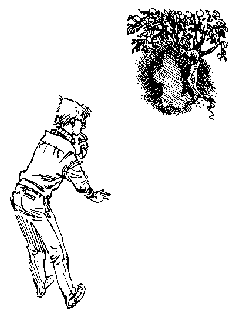
Alice howled disgracefully as I carried her back to the verandah.
What had been under the apple-tree? A hallucination?
“Why did you do it?” roared Alice. “You promised me…”
“I’ve done nothing at all,” I answered. “There aren’t any spectres.”
“You saw him yourself, you did. Why are you telling me a lie? And, you see, he can’t bear any movement of the air. Honestly, don’t you realize you have to approach him slowly, so a breeze doesn’t blow on him?”
I did not know what to answer. One thing I was sure of. As soon as Alice went to sleep, I was going into the garden to search it with a pocket torch.
“And he gave me a letter for you. Only I won’t give it to you now.”
“What letter?”
“I won’t give it to you.”
Then I noticed the piece of paper crumpled up in her fist. Alice looked at me, and I at her. And, just the same, she finally gave it to me.
On the paper, in my handwriting, was the feeding time-table for red krumci. I’d been looking for it for three days.
“Alice, where did you find my time-table?”
“You turn it over. The spectre didn’t have any paper, so I gave him yours.”
On the reverse side, something was written in English, but I did not recognize the handwriting.
“My dear Professor,
“I make bold to apply to you, because I have fallen into a very unpleasant predicament which I cannot get out of without outside help. Unfortunately, I also cannot leave this circle with a radius of one metre, the centre being the apple-tree. Only in darkness can I be seen in my pitiful predicament.
“Thanks to your daughter, a sensitive and responsive creature, I have finally been able to make contact with the outer world.
“I, Professor Kuraki, am the victim of an unsuccessful experiment. I carried out experiments in the physical transmigration of living matter over great distances. I managed to invisibly transmit two dematerialized turkeys and a cat from Tokyo to Paris. They were safely materialized by my colleagues. However, on the particular day I decided to make the experiment on myself, the fuses burnt out in the laboratory right in the middle of the experiment. There was not sufficient energy to complete it. I had melted away into space, but the more concentrated part of my body slightly materialized in the area of your cottage. I have been in this situation for two weeks, and am doubtless considered dead.
“Upon receiving my letter, I beg you to send a telegram to Tokyo immediately. Let somebody fix the fuses in my laboratory. Then I shall fully materialize.
“Thanking you in advance,
I stared for a long time into the darkness under the apple-tree. Then I left the verandah and approached the tree. A pale-blue, scarcely observable glow swayed round the trunk. Looking closer, I discerned the outlines of a man. It seemed to me that the ‘Spectre’ raised his hands in supplication to the heavens.
I wasted no more time. I ran to the monorail stop and videophoned Tokyo from the station.
All this took about ten minutes. Only on the way back did I remember that I had forgotten to put Alice to bed. I quickened my steps.
The verandah light was on.
Alice was showing her herbarium and butterfly collection to a short, emaciated Japanese. He was holding a pot and delicately eating the left-over farina, but not taking his eyes off Alice’s treasures.
Seeing me, the guest bowed low and said: “I’m Professor Kuraki, your eternal servant. You and your daughter have saved my life.”
“Yes, Daddy. This is my spectre,” said Alice. “Now, do you believe in them?”
“I do,” I answered. “Awfully glad to make your acquaintance.”
MISSING VISITORS FROM SPACE
Preparations were proceeding for the triumphant reception of the Labutsiltsians. Never before had the solar system been visited by travellers from such a distant star.
The first signals of their approach had been picked up on Pluto, and in three days’ time communications were established by the radio observatory at Londel.
The Labutsiltsians were still far away, but the cosmodrome Sheremetyevo-4 was in full readiness to receive them. Girls from the ‘Red Rose’ Factory had decorated it with flower garlands, and students of the Postgraduate Courses for Poets were rehearsing a musical-literary programme. All the embassies had reserved viewing stands on the tiered reception platform. Correspondents stayed overnight in the cosmodrome canteen.
Alice lived not far away in the cottage at Vnukovo, where she was collecting plants for her herbarium. She wanted a better one than Vanya Shpits’s — he was in a senior group at her kindergarten. So Alice took no part in the preparations for the triumphant reception. She did not even know about it.
And I myself had no direct relation to it. My work would begin later, after the Labutsiltsians landed.
Meanwhile, events ran as follows. On March 8, the Labutsiltsians advised that they were entering into circular orbit. Almost simultaneously the tragedy occurred. Instead of the Labutsiltsian ship, the radar station intersected the Swedish satellite ‘Nobel-29’ which was lost two years ago. By the time the mistake was discovered, it turned out that the Labutsiltsian ship had vanished. It was making a landing when contact was temporarily broken off.
On March 9, at 6.33 a.m. the Labutsiltsians advised that they had landed in an area of 55°20’ latitude North and 37°40’ longitude East according to the terrestrial system of coordinates, with a possible error of 15 minutes — that is, not far from Moscow.
Further contact was interrupted and not restored, with the exception of one instance which I will return to later. It seemed that terrestrial radiation had a deadly effect upon the Labutsiltsian communications system.
At the same moment, hundreds of cars and thousands of people were hurrying to the visitors’ landing-site. The roads were packed with people hoping to find them. The cosmodrome Sheremetyevo-4 was deserted: not one reporter remained in the canteen. The sky over Moscow was covered with hovercraft, helicopters, prop-wing, ornithopters and vortex-skimmers — all kinds of flying machines. It looked as if a monstrous swarm of mosquitoes hung over the earth.
Even if the Labutsiltsian ship had gone underground, it would have been found all the same.
But it was not found.
Not one local inhabitant had seen the ship come down. And the strangest thing of all was that at the time almost every resident of Moscow and its suburbs was watching the sky. That surely meant a mistake had been made.
By evening, as I was going to the cottage from work, all normal everyday life on Earth was fairly disrupted. People were afraid something had happened to the visitors.
“Perhaps,” they argued on the monorail train, “they are made of anti-matter and evaporated on entering the Earth’s atmosphere?”
“Without an explosion, without leaving a trace? Nonsense!”
“But how much do we know of the properties of anti-matter?”
“Then who sent the radio message that a landing had been made?”
“Maybe some joker?”
“Not bad for a joker! So you think, perhaps it was he who was talking with Pluto?”
“But perhaps they’re invisible?”
“Even so, our locators would have found them…”
Nevertheless, the version of invisible guests won the majority of supporters.
I sat on the verandah, thinking it over. What if they had landed right beside us, on the neighbouring field? Now, poor things, they were standing by their ship wondering why people wanted to ignore them. And were on the point of taking offence and flying off… I was ready to leave the verandah and head for that very field, when I saw a string of people coming out of the woods. They lived in neighbouring cottages. They were holding hands as if playing the children’s game ‘The Farmer in the Dell, The Farmer Takes a Wife’, except they weren’t in a circle, but spread out. I realized my neighbours had outguessed my thoughts, and were searching for the invisible visitors from space by the sense of touch. And at that moment all the radio stations in the world suddenly burst into a thousand tongues. They were broadcasting a taped communique picked up by an amateur radio station in northern Australia. The communique repeated the same longitude and latitude as before, followed by these words: “We are in a forest… Sent out the first group to search for people. We are tuned in to your broadcasts. There is a surprising lack of contact…” At that point, communication broke off.
The version of invisibility immediately gained a few more millions of supporters.
From the verandah I could see the chain of cottagers stop, and then swing toward the woods. And at that moment Alice came up the verandah steps carrying a basketful of wild strawberries.
“Why are they all running about?” she asked, not bothering to say ‘hello’.
“Who do you mean by ‘they’? And you should say ‘Hello’ when you haven’t seen your one and only father since morning.”
“Since last night. I was still asleep when you left this morning. Hi, Daddy. But what’s going on?”
“The Labutsiltsians are lost,” I answered.
“I don’t know them.”
“Nobody does, so far…”
“So how did they get lost then?”
“They were flying to Earth. Landed, and disappeared. ”
I felt as if I were talking nonsense. But it was the simple truth, you see.
Alice glanced at me with suspicion.
“But do things like that really happen?”
“No, they don’t. Not usually.”
“But couldn’t they find the cosmodrome?”
“I guess not.”
“And where, exactly, did they get lost?”
“Somewhere near Moscow. Perhaps, not far from our cottage.”
“And people are looking for them by helicopter and on foot?”
“That’s right.”
“But why don’t they come to us themselves?”
“Probably they’re waiting till people come to them. You see, it’s their first visit to Earth, so they don’t want to leave their spaceship.”
Alice was silent, as if satisfied with my answers. She walked along the verandah once or twice, without letting go of the basket of strawberries. Then she spoke.
“Are they in the fields or the woods?”
“In the woods.”
“And how do you know?”
“They said so themselves. Over the radio.”
“That’s good.”
“What’s good?”
“That they’re not in the fields.”
“Why do you say that?”
“I was afraid I’d seen them.”
“What’s that again?”
“Why nothing, I was joking.”
I leaped to my feet. Alice can tell some regular whoppers at times…
“I didn’t go into the woods, Daddy. Honestly, I didn’t. I was in a clearing. So I didn’t see them.”
“Alice, tell me everything, everything you know. And don’t add any embroidery of your own. Did you see in the woods any queer … people?”
“Honestly, I wasn’t in the woods.”
“Well, all right, in the clearing then.”
“I didn’t do anything wrong. And they weren’t queer at all.”
“Now, you give me a straight answer. Where was it, and whom did you see? Don’t torture me, and all mankind in my person!”
“And are you mankind?”
“Listen, Alice…”
“Well, all right. Here they are. They came with me.”
I unwittingly looked around. The verandah was empty. And if you didn’t count a buzzing bee, nobody was on it but Alice and me.
“No, no, Daddy. That isn’t the place to look.” Alice sighed, and came over beside me. “I wanted to keep them for myself. I didn’t know mankind was looking for them.”
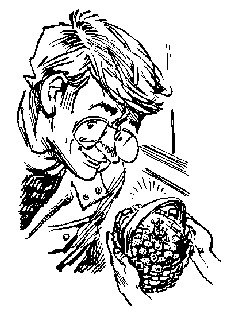
And Alice offered me the basket of wild strawberries. She raised the basket right up to my eyes and I, in complete unbelief, could clearly make out two little figures in space-suits. They were covered with strawberry juice, both sitting astride the same berry.
“I didn’t hurt them,” said Alice, in a guilty voice. “I thought they were gnomes from fairyland.”
But I wasn’t listening to her now. Tenderly holding the basket next to my heart, I dashed to the videophone, thinking that grass to them must have looked like a great forest.
That was how we first met the Labutsiltsians.
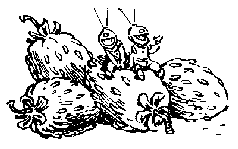
OUR MAN IN THE PAST
The time machine test was to take place in the small auditorium at the House of Sciences. I had gone to pick up Alice at the kindergarten, and only then realized that if I saw her home I should be late for the test. So I made Alice promise faithfully to be on her best behaviour, and we went to the House of Sciences.
The lecturer from the Time Institute, very large and very bald, stood before the time machine explaining its design to the scientific-minded audience, who listened with all attention.
“The first experiment, as you all know, was a failure,” he said. “The kitten we sent materialized in the beginning of the twentieth century and exploded in the region of the River Tunguska, giving birth to the legend of the Tunguska meteorite. Since that time we have had no serious failures. True, in conformity with certain regularities — anyone interested may acquaint himself with them by reading the brochures of our institute — we can, up to the present, send people and objects only as far back as the seventies of the twentieth century. I should like to point out that several of our working colleagues have been there, in absolute secrecy of course, and returned safely. The procedure itself of transference through time is comparatively simple, though many years of work done by hundreds of people lie behind it. All one has to do is don this chromocine belt… I should like a volunteer to come up from the audience, and I shall demonstrate the method of preparing a traveller through time.
There was an awkward silence. Nobody could bring himself to be the first to mount the platform. At this point, as you might expect, Alice appeared on the stage. Alice! Who had promised five minutes earlier to be well-behaved.
“Alice,” I cried out. “Come back at once.”
“Don’t worry,” said the lecturer. “Nothing will happen to the child.”
“Nothing will happen to me, Daddy!” cried Alice merrily.
All the audience began to laugh, and crane their necks to search for the stern father.
I pretended it had nothing to do with me.
The lecturer fastened the belt on Alice and attached something resembling ear-phones to her temples.
“That’s all there is to it,” he said. “Now the person is ready to travel through time. He has only to enter the cabin, and he’ll find himself in the year 1975.”
What did he have to say that for! And a feeling of panic drowned my thoughts. Alice won’t pass that chance up!
But it was too late to warn him.
“Where are you going, child? Stop!” cried the lecturer.
But Alice was already in the cabin, and right before the eyes of the audience — vanished. They all gasped in unison.
Turning pale, the lecturer waved his arms in an attempt to quiet the uproar. Seeing me running up the aisle, he grabbed the mike in order to be heard.
“Nothing will happen to the child. In three minutes, she will again be with us. I give you my word, the machine is absolutely safe and has come through every test. Please don’t be alarmed!”
It was all very well for him to be so sure. But I stood on the stage and thought about the fate of the kitten which became the Tunguska meteorite. I neither believed nor disbelieved the learned Doctor. But judge for yourself — how would you feel if you knew that your child was on her way to a hundred years ago in time? … And if she ran away from the machine? And got lost?
“Is it impossible for me to follow her?” I asked.
“Quite impossible. In just a minute… Now don’t you worry. You see, our man there will meet her.”
“You have an associate there?”
“Not exactly, he’s not quite an associate. Simply we found a man who understood our problems perfectly, and a second cabin stands in his flat. He lives there, in the twentieth century, but because of his special profession…”
At that moment, Alice appeared in the cabin. She came out on the stage with the look of a person who has done a good job well. And under her arm, she carried a thick, old-fashioned book.
“There, you see…” began the lecturer.
The audience gave him a friendly round of applause.
“Now, little girl, tell us what you saw,” said the Doctor, not letting me even approach Alice.
“It’s very interesting back there,” she replied. “Bam! And I’m in another room. A man was sitting at a desk, writing something or other. Then he asked me: ‘Are you from the twenty-first century, child?’ I said I probably was, but I couldn’t count to our century because I can’t count very well yet. That I only go to kindergarten, and am in the middle or junior group. Then the man said that it was very nice to see me, and that I should have to go back. ‘Would you like to see what Moscow was like before your grandfather was even born?’ he asked. I said I would. And he showed me. A most amazing town … the buildings weren’t very tall. Then he said that he was a writer who wrote science-fiction books about the future. It seems he doesn’t invent everything, because people from our time visit him and tell him all about it. Only he mustn’t tell anyone, because it’s terribly secret. He gave me a book of his… And then I came back.”
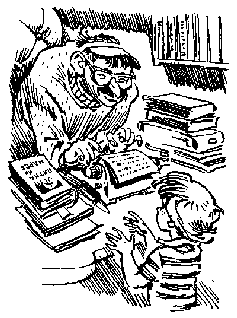
The audience met Alice’s story with stormy applause.
Then a highly esteemed academician stood up and said: “My dear girl, you are holding a very unique book — a first edition of the science-fiction novel Spots on Mars. Would you mind presenting it to me? After all, you can’t read yet.”
“No, sir,” said Alice. “You see, I’ll soon learn to, and then I’ll read it myself.”